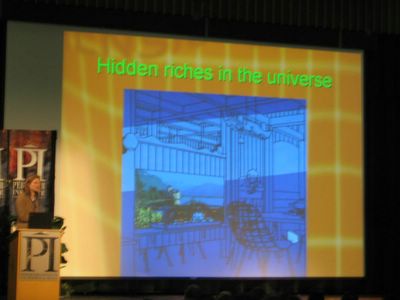Our visible universe is like the tip of the
iceberg. There is much, much more of the unknown physical world than the known, visible one. This was one of Damian Pope's idea relating to the mystery of dark matter during
last week Black Hole public session.
The tip of the iceberg, is one of the recurring theme that comes up during
PI's
public events. Almost each time, I hear how little we know about the physical world. Last year, for example, during the Einsteinfest intriguing
Inventors, Inventions, Conquerors and Conquests - The Ingredients for Success Bistro Banter, when the debate about how much we know (minute 29:26) was on, an analogy was drawn between how little we know about universe (minute 32:58) and our knowledge of the bottom of our oceans (minute 30:21). Also,
Lisa Randall during hers "Warped Passages" public lecture on March the 1st this year, said that "secrets of the Universe are about to unravel" and that there are "hidden riches in the Universe" (see below picture).
If we don't see the dark matter how do we know about it? In physics it is not unusual to know that something exists without seeing it. Take for example the magnetic/radioactive forces or electromagnetic waves. They are there but we don't see them. We experience though their presence. Sometimes such an experience could be quite helpful (as in the
antimatter case).
Among the many explanations regarding
dark matter's existence Damian used the
Rubin-Ford experimental observations to convince us. I will explain next time how he did it.







